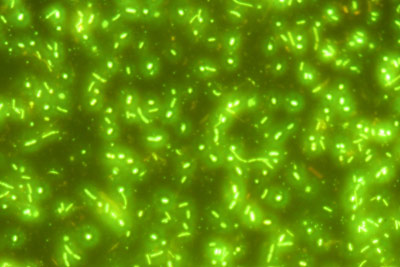First comprehensive survey of gut, mouth and arterial bacteria finds links to heart disease
By Krishna Ramanujan

The same types of bacteria found in arterial plaque, which causes atherosclerosis, are also found in the mouth and gut, according to the first general survey of all bacteria found in plaques from the mouth, gut and blood.
The study, conducted by researchers from Cornell and University of Gothenburg, Sweden and published online in the Proceedings of the National Academy of Sciences, may one day offer new ways to detect heart disease and could lead to drugs that target these bacteria to reduce arterial plaque and atherosclerosis.
In atherosclerosis, a fatty material called plaque collects along the walls of arteries, where it thickens, hardens (forming calcium deposits) and may eventually block the arteries.
"Our survey shows that bacteria are pretty good at getting out of the mouth and gut and into the blood stream," said Ruth Ley, Cornell assistant professor of microbiology and a senior author of the study with Frederik Bäckhed, a cardiovascular researcher from the University of Gothenburg. Omry Koren, a postdoctoral researcher in Ley's lab, is the paper's lead author.
The study used samples from the mouth and feces (to determine bacteria in the gastrointestinal tract) from 15 heart disease patients who had plaque removed from their arteries. Samples were also taken from a control group of 15 healthy individuals who matched the heart disease patients by sex and age.
The findings show that such bacteria as Veillonella and Streptococcus were the most abundant microbiota found in plaque. Furthermore, when a lot of these two types of bacteria were found in the mouth, the researchers found a corresponding abundance of the same bacteria in the arterial plaque.
Previous studies have provided evidence that bacteria from the mouth and gut may play a role in the formation of arterial plaque, leading to coronary disease. Studies have shown that mice, whose immune systems were compromised in such a way that they could not detect bacteria, were resistant to atherosclerosis, leading researchers to suspect that arterial plaque forms partly due to the body's immune reactions to bacteria.
Ley and colleagues found a positive correlation between amounts of bacteria and leukocytes (white blood cells) in arterial plaque, supporting the theory that higher levels of arterial plaque lead to an immune response and inflammation.
Also, Chryseomonas bacteria were found in all samples of atherosclerotic plaque, suggesting that the bacteria may contribute to its development. Also, Streptococcus in the mouth and gut were positively correlated with HDL ("good") cholesterol, while a number of other gut bacterial were positively correlated with LDL ("bad") and total cholesterol.
The study, which used high throughput DNA sequencing techniques to get more comprehensive data than in previous research, was funded by the Swedish Research Council, National Institutes of Health, National Science Foundation and others.
Media Contact
Get Cornell news delivered right to your inbox.
Subscribe